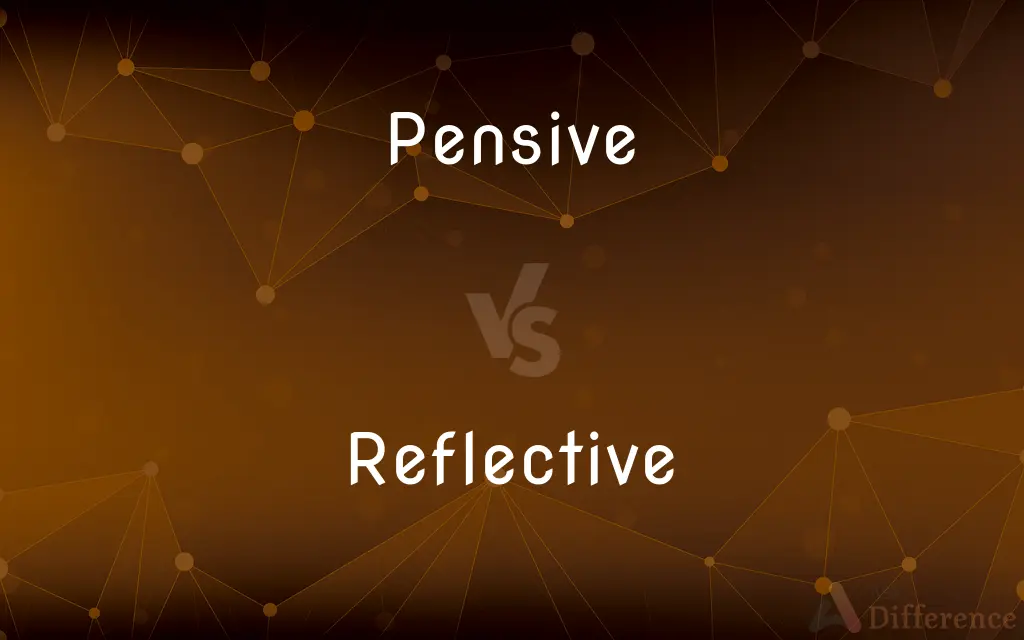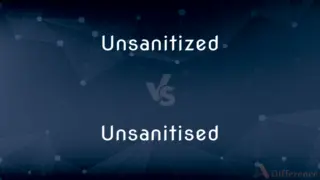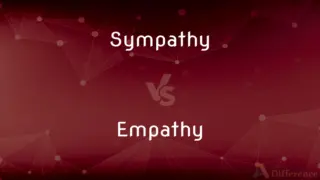Pensive vs. Reflective — What's the Difference?
By Urooj Arif & Maham Liaqat — Updated on April 25, 2024
Pensive describes a deep, often melancholic state of thought, focusing on introspection with a somber tone, while reflective implies a thoughtful state involving careful consideration or meditation, often with a neutral or positive tone.

Difference Between Pensive and Reflective
Table of Contents
ADVERTISEMENT
Key Differences
Pensive implies a level of deep, often wistful or somber thought that typically involves personal reflection tinged with sadness or melancholy. This state is usually inward-looking and serious. On the other hand, reflective involves thoughtful examination that can be about personal experiences or external ideas, generally without an inherent emotional tone of sadness or melancholy.
In literature, a pensive character might be described in scenarios that evoke solitude and introspection, possibly reflecting on past events with regret or longing. Reflective characters, however, are often portrayed in moments of learning or insight, contemplating lessons learned or paths to take, suggesting a more proactive or balanced emotional state.
The term pensive is often used when describing scenes in poetry and prose where the environment mirrors the character’s mood, such as a gloomy, rainy afternoon. Whereas, reflective might be used in contexts where a character is considering more philosophical questions, often triggered by a significant event or a moment of clarity.
Being pensive can sometimes lead to or be associated with feelings of depression or deep sadness due to its inward and sometimes negative focus. Reflective thinking, however, is typically more detached and rational, aimed at gaining understanding or solving problems, thus often leading to constructive outcomes or personal growth.
The outcome of pensive thinking might not always be positive, as it can spiral into deeper emotional ruts. In contrast, reflective thinking is more likely to result in new perspectives or resolutions, as it involves analyzing and evaluating one's thoughts or actions objectively.
ADVERTISEMENT
Comparison Chart
Definition
Deeply, often sadly thoughtful.
Engaged in, involving, or reflecting deep thought.
Emotional Tone
Typically somber or melancholic.
Neutral or positive, contemplative.
Focus of Thought
Inward and personal, often with a negative bias.
Broader, can be personal or external, typically constructive.
Common Usage
Often in literature to describe characters in a state of sadness or introspection.
Used to describe thoughtful consideration in a variety of contexts.
Outcome
Can lead to emotional heaviness or stagnation.
Often leads to insights, solutions, or personal growth.
Compare with Definitions
Pensive
Reflecting deep or serious thought about something potentially troubling.
His pensive expression revealed his concern about the news.
Reflective
Capable of thoughtful analysis about past or present events.
He became reflective after the seminar, pondering over the ideas discussed.
Pensive
Involving sad or reflective sadness due to recent events.
The documentary left us in a pensive state, reflecting on the complexities of human nature.
Reflective
Involving careful consideration or thought about something.
In a reflective tone, he discussed the potential outcomes of the decision.
Pensive
Indicative of thoughtful sadness or contemplation.
In a pensive moment, she reconsidered her journey so far.
Reflective
Engaged in, involving, or reflective of deep or serious thought.
The teacher was reflective about her methods and how to improve student engagement.
Pensive
Deeply or seriously thoughtful, often with a tinge of sadness.
She sat by the window in a pensive mood, contemplating her past decisions.
Reflective
Marked by or given to meditation or contemplation.
The quiet retreat provided a reflective atmosphere ideal for personal growth.
Pensive
Characterized by melancholy thinking or contemplation.
He wrote a pensive poem that captured the essence of loss.
Reflective
Indicative of deep contemplation, possibly leading to insights.
Her reflective journal entries showed a mature understanding of her experiences.
Pensive
Pensive (February 5, 1941 – May 20, 1949) was a bright chestnut Thoroughbred racehorse that in 1944 won the first two legs of the U.S. Triple Crown. Pensive also began only the second sire line "hat trick" in the Kentucky Derby, as his son Ponder won the 1949 Derby, and Ponder's son Needles won the 1956 edition.
Reflective
Providing a reflection; capable of reflecting light or other radiation
Reflective glass
Reflective clothing
Pensive
Engaged in, involving, or reflecting deep or serious thought
A pensive mood
Reflective
Relating to or characterized by deep thought; thoughtful
A quiet, reflective, astute man
Pensive
Engaged in deep and serious thought.
Reflective
Of, relating to, produced by, or resulting from reflection.
Pensive
Showing or expressing deep, often melancholy thought
A pensive look.
Reflective
Capable of or producing reflection
A reflective surface.
Pensive
Having the appearance of deep, often melancholic, thinking.
Reflective
Characterized by or given to serious thinking or contemplation; thoughtful.
Pensive
Looking thoughtful, especially from sadness.
Reflective
That reflects, or redirects back to the source.
Mirrors are reflective.
Pensive
Thoughtful, sober, or sad; employed in serious reflection; given to, or favorable to, earnest or melancholy musing.
The pensive secrecy of desert cell.
Anxious cares the pensive nymph oppressed.
Reflective
Pondering, especially thinking back on the past.
He always becomes reflective in preparation for the new year.
Pensive
Expressing or suggesting thoughtfulness with sadness; as, pensive numbers.
Reflective
That reveals or shows; revealing; indicative of.
Pensive
Persistently or morbidly thoughtful
Reflective
Involving reflection.
Pensive
Showing pensive sadness;
The sensitive and wistful response of a poet to the gentler phases of beauty
Reflective
(grammar) Reciprocal.
Reflective
Throwing back images; as, a reflective mirror.
In the reflective stream the sighing bride, viewing her charms.
Reflective
Capable of exercising thought or judgment; as, reflective reason.
His perceptive and reflective faculties . . . thus acquired a precocious and extraordinary development.
Reflective
Addicted to introspective or meditative habits; as, a reflective person.
Reflective
Reflexive; reciprocal.
Reflective
Persistently or morbidly thoughtful
Reflective
Capable of physically reflecting light or sound;
A reflective surface
Reflective
Devoted to matters of the mind;
The reflective type
Common Curiosities
Can both pensive and reflective states be beneficial?
While both states can offer deep personal insights, reflective states are generally more likely to lead to constructive outcomes.
What is the key emotional difference between pensive and reflective states?
Pensive is generally associated with sadness or melancholy, while reflective has a more neutral or even positive tone.
What environments foster pensive thinking?
Quiet, solitary environments can foster pensive thinking, particularly those that match the mood of introspection.
What types of thoughts characterize a pensive state?
Thoughts in a pensive state are typically inward-looking and may dwell on negative aspects or past regrets.
What is an example of a reflective practice?
Journaling or meditative practices can be considered reflective, as they encourage deep thinking and consideration.
How are these terms used differently in literature?
Pensive is often used to describe situations with a somber or reflective mood, reflective is used more broadly to indicate deep thought or contemplation.
Is it common for people to experience both pensive and reflective states?
Yes, individuals may experience both states at different times, depending on their mood and the situations they face.
What literary characters are famously pensive?
Hamlet from Shakespeare's play is a famously pensive character, often lost in his melancholic reflections.
How might one shift from a pensive to a reflective state?
Focusing on solutions or broader perspectives rather than dwelling on emotions can help shift from pensive to reflective thinking.
What environments are best for reflective thinking?
Environments that are calm but stimulating, like nature or organized retreats, can enhance reflective thinking.
How do pensive and reflective thinking impact decision-making?
Pensive thinking may cloud judgment with emotions, while reflective thinking typically aids in making more balanced decisions.
How can reflective thinking improve personal relationships?
Reflective thinking can improve understanding and empathy, leading to stronger and more thoughtful interpersonal interactions.
How can teachers encourage reflective thinking in students?
Encouraging students to question, analyze, and connect ideas can foster reflective thinking.
Can pensive thinking be a symptom of mental health issues?
Excessive pensive thinking, especially if focused on negative aspects, can be a symptom of depression.
What tools can aid in reflective thinking?
Tools like reflective journals, dialogue with others, or structured reflection practices can aid in reflective thinking.
Share Your Discovery

Previous Comparison
Unsanitized vs. Unsanitised
Next Comparison
Sympathy vs. EmpathyAuthor Spotlight
Written by
Urooj ArifUrooj is a skilled content writer at Ask Difference, known for her exceptional ability to simplify complex topics into engaging and informative content. With a passion for research and a flair for clear, concise writing, she consistently delivers articles that resonate with our diverse audience.
Co-written by
Maham Liaqat















































